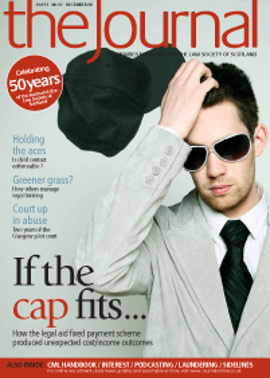Old friends revisited

Appearing for Crown appeals
Urquhart v Campbell [2006] HCJAC 76; 2006 GWD 35-720 is an appeal about appeals, so there might be something to be said for starting there. The Crown appealed what it regarded as unduly lenient sentences imposed in respect of road traffic matters. At the hearing the accused was represented by counsel and solicitor but was not personally present. The court asked for submissions about whether an appeal could properly be heard in the accused’s absence in circumstances in which he might receive a more severe sentence. (The question whether or not this issue should itself have been debated in the absence of the accused fortunately did not happen to be considered, otherwise we should have been in a never-ending spiral.)
The court held that it would be unsatisfactory to hear the appeal without the accused being there, and then, if necessary, continue it for a different sentence to be imposed. It was observed that consideration should be given to adopting a procedure encouraging accused persons to be present at the hearing of such an appeal. It is not easy to conclude how the attendance of an accused in such circumstances could be compelled, and in particular difficulties might arise if the appeal court was considering imprisoning someone not then in custody.
Deforcement revisited
It is not exactly “Friends Reunited”, but there must be a good few of us who did not expect to come across that old university chum “Deforcement of Messengers” again. Those interested are directed to Urquhart v Macphail 2006 GWD 33-688. The point at issue was whether or not it was competent to try this crime in the sheriff court, the gravamen of the charge being that the accused had deforced a sheriff officer to prevent him executing a warrant granted by a sheriff for recovery of a sum of money. Presumably if the point had been well founded the accused would have ended up in the High Court, which would at best be regarded by most of us as a mixed result. It was held that the observations of Hume and Macdonald, although no doubt good in their time, had to be read in the light of s 3(6) of the Criminal Procedure (Scotland) Act 1995, which deals with the exclusive jurisdiction of the High Court and does not mention this particular crime.
Intention to guide
Well, one swallow does not make a summer, and here is another old friend, “Seclusion of the jury”, as per McLeod v HMA [2006] HCJAC 79; 2006 GWD 35-718. Certain rules about the conduct of jury trials remain in force and it is hoped that adequate training is given to all those involved with juries, as some at least will not be lawyers by training. In this case a bar officer, entering the jury room to ask whether the jury had reached a verdict (a bit risky, one might think), was asked by the spokesman what would happen if some jury members did not agree with the wording when the verdict was given. The bar officer replied by asking whether at least eight of them agreed with the wording. The Crown maintained that this did not constitute a miscarriage of justice, but the appeal court allowed the appeal, quashed the conviction and granted leave for a new trial. It was held that the question was intended to guide or advise, and possibly even direct, the jury. Accordingly there was found to have been a breach of s 99(2) of the Criminal Procedure (Scotland) Act 1995, as well as of s 92(1), in that what was said had been said outwith the presence of the appellant. While we did, last time, say something about the wisdom of refraining from quoting the poets, one can scarcely refrain from observing that “a little learning is a dang’rous thing” (Pope).
Repeated commission
It might be preferable to describe Moorov as more of an acquaintance than a friend, but the doctrine crops up again, this time by virtue of not being mentioned, in Stephen v HMA [2006] HCJAC 78; 2006 GWD 35-713. This was an appeal against conviction on two charges of lewd and libidinous practices, the grounds being threefold. The first was that the sheriff had misdirected the jury by telling them that the evidence of one victim, C, was capable of corroboration in relation to the separate heads of the first charge by viewing the appellant’s acts as constituting a course of conduct; the second that there had been an error in the jury being told that corroboration was not required in respect of each separate head; and thirdly, that because the Moorov doctrine had not been relied on by the Crown or mentioned in the sheriff’s charge, the appeal court should not now invoke it, since one could only speculate about what the jury might have done had the doctrine been put before them.
The appeal was refused. The court stated that where a crime such as lewd and libidinous practices was alleged to have been committed repeatedly, it was legitimate to libel it as a single crime constituted by repeated criminal acts of the same character, and this situation was not altered by the Crown having provided additional specification by linking each act with a particular locus. Further, corroborative evidence of two differing instances of the seven of which the appellant was ultimately convicted amounted to sufficient corroboration to entitle the jury to convict of the whole course of conduct spoken to by one victim.
Actings as corroboration
The question of corroboration was again addressed by the appeal court in Law v HMA [2006] HCJAC 63; 2006 GWD 32-677. The principles set out in Fox v HMA 1998 SLT 335 were affirmed and it was held that the judge had been correct in refusing a submission of no case to answer. The appellant was said to have been acting along with a co-accused, and the direct evidence of her involvement from the complainer was held to have been corroborated by evidence of some of her actings which was capable of supporting the complainer’s account. In particular there had been CCTV footage which had apparently shown the appellant trying to hide the complainer’s injured face; and evidence from the complainer’s parents as to how the appellant had acted on arrival was both consistent with the complainer’s account and strongly indicative of her guilt.
Alternative not charged
The unreported case of Ross Angus v Procurator Fiscal [2006] HCJAC 67, decided on 26 July 2006, is not without interest. The appeal was against the decision of a sheriff convicting the appellant on a charge of dangerous driving. As it happened the appeal was not successful and the conviction was not disturbed. The appeal court did, however, go on to consider whether it would have been possible in the circumstances, where there was no alternative charged and indeed no such verdict sought in the lower court, to substitute a verdict of guilty of careless driving. While the matter was not decided, the court felt that there should not be any difficulty about this if appropriate, since evidence would of necessity have been given about the quality of driving.
Appeal against insanity
Also unreported is Wing Hong Brian Yung v Procurator Fiscal [2006] HCJAC 70, decided on 12 September 2006. The appellant had been charged with three assaults, on summary complaint. The sheriff, after sundry procedure, found that the appellant had committed the acts complained of, beyond reasonable doubt, and also, on the balance of probability, that he was insane at the time. The appellant was accordingly acquitted on grounds of insanity in terms of s 55(3) and (4) of the Criminal Procedure (Scotland) Act and an interim compulsion order was made in terms of s 57(2)(b). The appeal purported to proceed on the basis that the sheriff’s finding was made in terms of s 55(2) of the Act, but the Crown took a preliminary plea to the competency of the appeal, in respect that the sheriff had made no such finding but had acquitted the appellant in terms of s 55. The preliminary plea was sustained by the court, it being noted that Parliament had made no provision for appeal against acquittal, and standing that there is provision under s 57(2) for an appeal against an order following acquittal in terms of s 55, the appellant’s right to challenge any order restricting his liberty was safeguarded.
Appearance of fairness
Finally, and as an indication of how important it is that justice should be seen to be done, there is the case of Gilmour v HMA [2006] HCJAC 73; 2006 GWD 32-679. This was a referral from the Scottish Criminal Cases Review Commission in respect of a conviction for rape and murder. The appellant objected to a particular judge taking part in the referral on the grounds that he had appeared as advocate depute at the advising of the appellant’s appeal in December 1982, and a fair minded observer would apprehend that he had thus had access to Crown papers and therefore justice would not be seen to be done. It was the judge’s position that he had no recollection whatsoever of the case and accordingly no reasonable person could conclude that there was a possibility of bias. It was held that a fair minded and informed observer would be justified in thinking that the necessary appearance of fairness was lacking, it being reasonable to suppose that the judge had at the time been involved in discussions over authority for a new prosecution in the event of the appeal being successful, and that in any case a detailed consideration of the evidence in a referral might result in the judge recalling significant points which would make his participation inappropriate. The judge therefore recused himself.
In this issue
- Costume Wars: copyright storm over the troopers
- The end of the beginning
- Public appointment: public interest
- Fixed payments: a real impact?
- Training: the bigger picture
- Contact breakers
- Abuse in the system
- Stirring up interest
- Twin-tracking law reform
- Hung out to dry
- Fraud: the client's perspective
- The proof is in the podding
- How did you do?
- Old friends revisited
- A reprieve for landlords?
- Smell of success
- There's no case like Rome
- Hurt in the pocket
- Flotation and the trustee
- Scottish Solicitors' Discipline Tribunal
- Website reviews
- Book reviews
- Risk and the in-house lawyer
- The CML Handbook revised
- Ten things you should know about SDLT
- All change at the Registers






